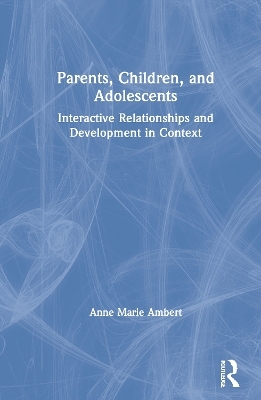
Parents, Children, and Adolescents
Routledge (Verlag)
978-0-7890-6034-1 (ISBN)
- Titel z.Zt. nicht lieferbar
- Versandkostenfrei innerhalb Deutschlands
- Auch auf Rechnung
- Verfügbarkeit in der Filiale vor Ort prüfen
- Artikel merken
parents’child-rearing styles and how they are affected by environmental variables
the interaction between parents and children, and between their personalities
behavior genetics as one of the explanatory frameworks for the role of genetics and environment
negative child outcomes--emotional problems, conduct disorders, and delinquency
poverty and other stressors affecting parents and children
problematic-abusive, emotionally disturbed, alcoholic parents
siblings and peers as contexts for the parent-child dyad
the effect of the school system on the family, with a focus on minority families
family structure--divorce, remarriage, and families headed by never-married mothers
adolescent mothers and their own mothers
the psychogenetic limitations on parental influence and cultural roadblocks to parental moral authorityComplete with an Instructor’s Manual, Parents, Children, and Adolescents is ideal for advanced undergraduate and graduate classes in family studies and human development, sociology of the family, interdisciplinary developmental psychology, and social work classes that need a thorough perspective on the parent-child relationship. Professionals and scholars in these fields seeking an interdisciplinary framework as well as research suggestions and incisive critiques of traditional perspectives will also find this innovative book a valuable addition to their reading lists.
Anne Marie Ambert (Author)
Contents
Preface (Terry S. Trepper) Acknowledgments Introduction Part I. The Parent-Child Relationship and Development over the Life Cycle Chapter 1. The Relationship Between Parents and Their Small Children Personality Defined Origins of Personality The Effect of Personality on the Parent-Child Relationship The Role of Sociodemographic Characteristics Quality of the Parents’ Relationship Conclusion Chapter 2. The Relationship Between Parents and School-Age Children The Role of Day Care The Impact of School Mass Media The Interactional Perspective Resilient Children Gender of Child and Parent Conclusion Chapter 3. The Parent-Adolescent Relationship The Nature of Adolescence Parenting Practices and Patterns Origins of Parenting Practices Parent-Adolescent Conflict The History of Parental Influence Conclusion Chapter 4. The Relationship Between Parents and Adult Children Changing Young Adulthood: A Demographic Perspective The Parent-Young Adult Relationship Continuity in the Parent-Child Relationship The Role of Personality Stability The Parent-Middle-Age Child Relationship Exchange with Aging Parents Elder Abuse by Children Conclusion Part II: The Contexts of Development and of the Parent-Child Relationship Chapter 5. The Parent-Child-Sibling Context The Younger Sibling’s Arrival Child and Adolescent Sibling Relationships Adult Sibling Relationships Differential Parental Treatment Developmental Impact of Differential Treatment Additional Research Questions Helpful Sibling Relationships The Impact of Siblings’ Shared Friends Conclusion Chapter 6. The Parent-Child-Peer Context Peers and the Acquisition of Social Skills: A Critique Youth Cultures Parents’ Role in Children’s Peer Interactions A Study of Peer Abuse Th
| Erscheint lt. Verlag | 25.3.1997 |
|---|---|
| Verlagsort | New York |
| Sprache | englisch |
| Maße | 152 x 229 mm |
| Gewicht | 771 g |
| Themenwelt | Geisteswissenschaften ► Psychologie ► Entwicklungspsychologie |
| Geisteswissenschaften ► Psychologie ► Sozialpsychologie | |
| ISBN-10 | 0-7890-6034-5 / 0789060345 |
| ISBN-13 | 978-0-7890-6034-1 / 9780789060341 |
| Zustand | Neuware |
| Haben Sie eine Frage zum Produkt? |
aus dem Bereich


